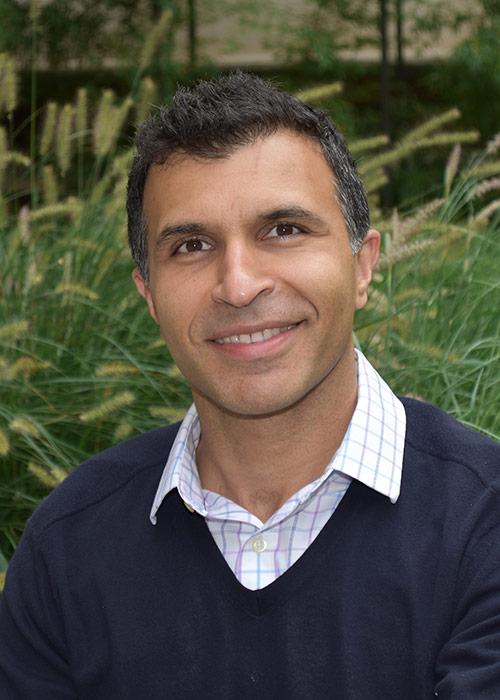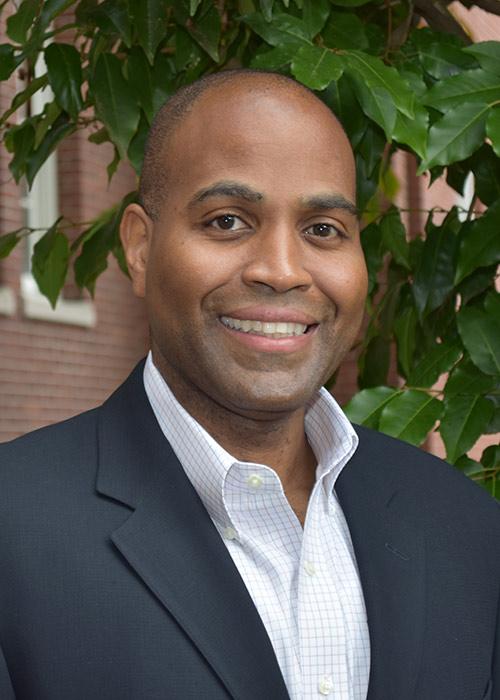Congratulations to Ali Shojaie, Timothy Thornton, and Marco Carone, core faculty members in the Department of Biostatistics who received promotions to new appointments effective July 1, 2020.
Ali Shojaie
Promoted to Full Professor

Dr. Ali Shojaie’s research focuses on developing statistical methods for high-dimensional networks, an emerging research area with many interesting methodological and applied problems. His work involves developing methods for analyzing large, complex biological and social systems, and developing statistical machine learning methods for estimation and inference in high-dimensional problems.
Examples of Shojaie’s current research include exploring mechanisms of cardiac arrhythmia through analysis of multi-omics data from the Trans-Omics for Precision Medicine (TOPMed) program (funded by an R01 grant from National Heart, Lung and Blood Institute); analyzing high-dimensional time series data from neuroscience (funded by an grant from the NSF Computational and Data-Enabled Science and Engineering in Mathematical and Statistical Sciences program); developing methods for discovering active metabolic pathways (funded by an R01 grant from National Institute for General Medical Sciences); and identifying changes in biological network associated with aging (funded by a grant from the Joint DMS/NIGMS Initiative to Support Research at the Interface of the Biological and Mathematical Sciences).
Shojaie is also the founding director for the 6th Annual Summer Institute in Statistics for Big Data (SISBID) which introduces biologists, quantitative scientists, and statisticians to modern statistical techniques for the analysis of biological data. This year's institute will be offered online from July 13 through 24 and will offer modules on different aspects of Big Data such as statistical analysis, visualizing data, and the challenges surrounding reproducible research.
More on Shojaie: Bio | Faculty Page
Timothy Thornton
Promoted to Full Professor

Dr. Timothy Thornton is the Robert W. Day Endowed Professor of Public Health. His primary research is in the area of statistical genetics and his lab develops statistical and computational tools for the analysis of large-scale genotyping and sequencing data. Thornton has more than 95 publications in peer-reviewed journals, and his collaborative research has focused on providing new insights into the genetic underpinnings contributing to human health and health disparities, particularly in underserved and underrepresented minority populations.
Thornton is a core faculty member in the Department of Biostatistics. He also has an adjunct appointment in the Department of Statistics and is an Affiliate Investigator at the Fred Hutchinson Cancer Research Center. In 2019, Thornton took on a new leadership role in the department as Director of the Biostatistics Graduate Program. He is also the program director for the Statistical Genetics Training Grant.
A recent study co-lead by Thornton and which was published in Alzheimer’s and Dementia, identified Caribbean Hispanic individuals with African-derived ancestry at their APOE gene to have 39 percent lower odds of Alzheimer’s disease compared to individuals with European-derived APOE. This work has significant implications in helping scientists better understand the role that ancestry plays in genetic risk of the disease in the future. Read more about findings and collaborators of this study.
More on Thornton: Bio | Faculty Page
Marco Carone
Promoted to Associate Professor

Dr. Marco Carone’s research focuses on the integration of modern learning techniques into the statistical analysis of epidemiologic and clinical data.
In November 2019, Carone received a $2.7 million research grant from the National Institutes of Health to develop novel statistical tools to more effectively describe the health effects of common medical therapies using data from electronic health records (EHRs).
In this NIH-funded project, Carone and a multidisciplinary team of experts in biostatistics, health informatics and pharmaco-epidemiology are developing novel techniques to address several challenges with the use of EHR data. As with other sources of observational data, the treatment a patient is observed to have received is often associated with patient characteristics such as acute indications, sex, age, socioeconomic status and health history, and these factors must be carefully accounted for to assess treatment effects. Additionally, data are often missing in EHRs, and the EHR of certain patient types may be more likely to include missing data than for others. Careful adjustment for such phenomenon is needed to produce reliable inferences, Carone says. To tackle these problems, the project team is developing flexible statistical learning methods for robust inference on health effects. Their work also includes developing efficient online learning techniques for use with streaming health surveillance data, and methods tailored to settings with rare outcomes, a notoriously difficult statistical problem at the heart of pharmacological safety surveillance.
Carone was named the inaugural Norman Breslow Endowed Faculty Fellow in 2019, a fellowship that was established by former UW Biostatistics Department chair Norman E. Breslow and his family to enhance recruitment and retention of distinguished faculty in biostatistics. He is an adjunct faculty member in the UW Department of Statistics and an affiliate investigator in the Vaccine and Infectious Disease Division at the Fred Hutchinson Cancer Research Center. He is also a co-director of the ID-PRISM Center, a collaborative including Fred Hutch and UW faculty, students and staff focused on the development of innovative statistical methods for infectious disease prevention research. In 2018, Carone received the Outstanding Faculty Teaching Award from the UW School of Public Health.
More on Carone: Bio | Faculty Page